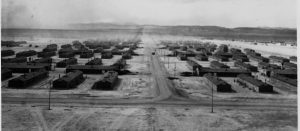
The Topaz War Relocation Center, where Fred Korematsu was sent after his arrest (National Archives)
In his majority opinion in Trump v. Hawaii, Chief Justice John Roberts overturned the ruling in Korematsu v. United States (1944) that had stood for nearly three quarters of a century in response to a dissent written by Justice Sonia Sotomayor that drew parallels between the opinion in Trump and that in Korematsu.
Roberts’s opinion in Trump upheld an Executive Order by President Donald Trump to exclude people from several predominantly Muslim countries from traveling to the United States on national security grounds. Koremastu upheld the internement of Japanese Americans during World War II ruling that it was based on “proper security measures” in time of war.
Justice Roberts denied any relation between Trump and Korematsu, but took the opportunity of its mention to overturn Korematsu, quoting a dissent by Justice Robert Jackson. “Koremastu was gravely wrong the day it was decided, has been overruled in the court of history, and—to be clear—’has no place in law under the Constitution.'”
In her dissent in Trump, Justice Sotomayor wrote, “By blindly accepting the Government’s misguided invitation to sanction a discriminatory policy motivated by animosity toward a disfavored group, all in the name of a superficial claim of national security, the Court redeploys the same dangerous logic underlying Korematsu and merely replaces one ‘gravely wrong’ decision with another.”

